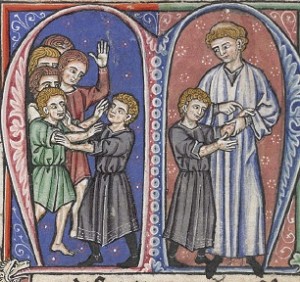PRIMARY SOURCE SATURDAY
Where I post a primary source in translation.
Today this is from my current research reading. William of Tyre’s ‘A History of Deeds Done Beyond the Sea’ Historia rerum in partibus transmarinis gestarum. It’s a history of the Middle East in the period of the crusades.
William of Tyre was a tutor to the future Baldwin IV (1161-1185) the leper king of Jerusalem and on the throne when William Marshal arrived in Outremer.

William of Tyre discovers Baldwin’s Leprosy 13th C illustration from William of Tyre British Library.
“When I was archdeacon of Tyre, King Amaury, anxious about the education of his son, after many entreaties and under assurance of his favour, prevailed upon me to undertake the task of tutor. The boy, then about nine years old, was accordingly committed to my care to be instructed and nurtured in liberal studies.
While he was under my charge, I devoted myself to my royal pupil with vigilant care and watched over him with the solicitude befitting his exalted position. I endeavored to train him in the formation of character as well as to instruct him in the knowledge of letters.
He was playing one day with his companions of noble rank, when they began, as playful boys often do, to pinch each other’s arms and hands with their nails. The other boys gave evidence of pain by their outcries, but Baldwin, although his comrades did not spare him, endured it altogether too patiently, as if he felt nothing. After this had occurred several times it was reported to me. At first i supposed that it proceeded from his capacity for endurance and not from lack of sensitiveness. But when I called him and began to inquire what it meant, I discovered that his right arm and hand were partially numb so that he did not feel pinching or even biting in the least.I began to be uneasy, remembering the words of the wise man, ‘There is no question that a member which is without feeling detracts greatly from the health of the body and one who does not realise that he is sick is in danger.’
The lad’s father was informed of his condition, and physicians were consulted. Repeated fomentations, oil rubs, and even poisonous remedies were employed without result in the attempt to help him. For, as was recognised in process of time, these were the premonitory symptoms of a most serious and incurable disease which later became plainly apparent.
It is impossible to refrain from tears while speaking of this great misfortune. For, as he began to reach years of maturity, it was evident that he was suffering from the terrible disease of leprosy. Day by day his condition became worse. The extremities and the face were especially attacked, so that his faithful followers were moved with compassion when they looked at him. Nevertheless, he continued to make progress in the pursuit of letters and gave ever increasing promise of developing a lovable disposition.
He was comely of appearance for his age, and far beyond the custom of his forefathers he was an excellent horseman and understood the handling of horses. He had a retentive memory and he loved to talk. He was economical but always remembered both favours and injuries. In every respect he resembled his father, not alone in face, but in his entire mien; even his walk and the tones of his voice were the same. His intellect was keen, but his speech was somewhat halting. Like his father he eagerly listened to history and was well disposted to follow good advice.”